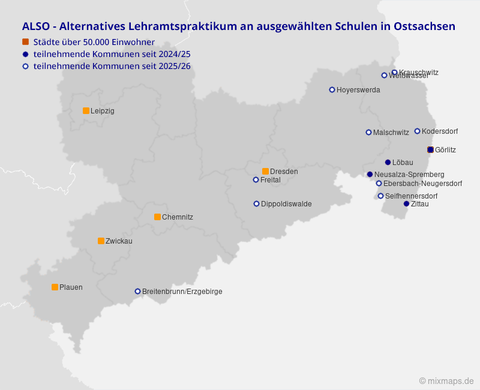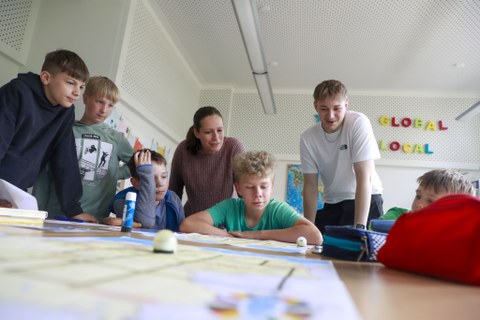Nov 05, 2025
Alleviating teacher shortages: Alternative teaching placement scheme launched in eastern Saxony and the Ore Mountains
116 students from TUD Dresden University of Technology have started semester-long school placements at 15 schools in rural areas of Saxony. During the 2025/26 school year, they will work in teams of four with 5th grade classes at secondary schools every week. The future teachers will complete their mandatory placement over ten days. On the remaining days until the end of the school year, they will gain practical experience on the way to their graduation. Participants receive renumeration for their work during the placement.
The Alternative Teaching Placement at Selected Schools in Eastern Saxony was launched at four locations in the Görlitz area. Now, additional municipalities in the districts of Bautzen, Saxon Switzerland/Eastern Ore Mountains, and the Ore Mountains district are participating in the program. The student placement is coordinated and supervised by Prof. Anke Langner, Chair of Education / Inclusive Education at TU Dresden, and her colleagues. They also support the student teachers in connecting their classroom experience with academic work.
Boosting motivation for studies and teaching
“Students emerge from this extended placement phase feeling more invigorated,” says Anke Langner, based on the evaluation of the pilot phase in the 2024/25 school year. This results from reflection on their own teaching practice. The project manager is particularly pleased that, “Some who were previously in doubt about their choice of teaching as a career, and even considered changing subjects, found confidence in the classroom: ‘I can and really want to work with children.’ They are continuing their studies with a whole new level of motivation.” The tripling of the number of participating schools and students is also a promising sign. The scheme provides opportunities for schools that are affected by a high number of canceled classes.
“It exceeded my expectations!” says Lolita Pechanska, summarizing her experience as a “Friday teacher” at Pestalozzi Secondary School in Neusalza-Spremberg in the Görlitz district. She was surprised "how much fun it actually is to work with children! I never thought teaching could be so animated, spontaneous, and warm.” Starting this fall, she will continue to work at a school as part of a classroom team, because the experience “was so enriching that I definitely want to continue, with even more confidence, composure, and joy in working with children.” She advises other students to take advantage of this opportunity to “learn and grow in a very supportive environment.” The placement provides space to develop your own ideas, exchange views within the team, and engage in honest reflection. For her, it has been a valuable experience that “ has helped me find my way in education.”
More schools and more placement days to choose from
Following the pilot phase with four schools in the Görlitz district, the alternative teaching placement has now been extended to include 15 schools in four districts.

Following the pilot phase with four schools in the district of Görlitz, the alternative teaching placement can now be expanded to 15 schools in four districts.
Last year, participating schools in Zittau, Neusalza-Spremberg, Löbau, and Görlitz were able to gain experience with the placement students and, with their support, reduce the number of canceled classes. The 2025/26 school year will also include schools in Breitenbrunn, Dippoldiswalde, Ebersbach-Neugersdorf, Freital, Hoyerswerda, Kodersdorf, Krauschwitz, Malschwitz, Seifhennersdorf, and Weißwasser.
And during the 2025/26 school year, Wednesday and Thursday will also be placement days in addition to Fridays.
Combining theory with practice – intensive support at TU Dresden
The objective of the extended placement is to better prepare students for the demands of a career in teaching. Over the course of almost an entire school year, the students gain in-depth insights into working at a school and gather valuable experience. Experiences in the classroom are regularly reflected upon in seminars and evaluations together with the other students. The senior mentors (former teachers at the local schools) are also valuable contacts.
As part of their placement, the students do not teach traditional lessons. Instead, they work in teams of four to organize a joint learning day that is primarily dedicated to “learning how to learn.” In this role, they support students in reviewing and consolidating their mathematical and linguistic skills. Within this framework, future teachers are given the opportunity to focus on the teacher-student relationship in addition to subject-specific content. Democratic participatory processes also play a role in the planning and implementation stages.
The semester-long teaching placement was developed at University School Dresden. The educational methods used at participating schools are also being tested and researched at the University School Dresden as part of a collaborative pilot project on the school of the future by TU Dresden and the City of Dresden.
Numerous supporters enable innovative approaches with the Alternative Teaching Placement program
The continuation of this project was made possible by tax revenues based on the budget approved by the Saxon State Parliament (SMK and SMWK). In a publication by the Saxon State Ministry of Education and Cultural Affairs (SMK), Minister of Culture Conrad Clemens emphasizes the opportunities for Saxony: “Schools are places of learning for prospective teachers in addition to children and young people. The Alternative Teaching Placement program strengthens the connection between theory and practice, and brings fresh perspectives into day-to-day teaching. This benefits everyone involved: the students, the teachers at the schools, and above all the children attending school in Eastern Saxony."
Minister of Science Sebastian Gemkow adds: “In close collaboration with universities, we are breaking new ground by introducing students to the practical aspects of their future careers in schools while they are still studying.” The State Office for Schools and Education (Lasub) is responsible for administering contracts.
In addition to public funding, the pilot phase was also supported by various local partner organizations in Eastern Saxony and the commitment of the TÜV SÜD Foundation. TUDIAS also plays a key role in implementation by managing the contracts and processing payments to the students. Municipalities offer support by providing accommodation for the students, enabling teams to prepare together the evening before and to facilitate a smooth start to the school day with the pupils.
Press inquiries:
Maria Neuland Agüero
+49 173 260 9451
Project information TU Dresden: https://tu-dresden.de/gsw/ew/iew/ewib/studium/alternatives-lehramtspraktikum-also

